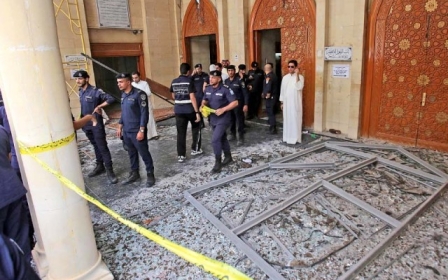Freed Kuwait opposition leader: Reforms needed to avert 'catastrophe'

Prominent Kuwaiti opposition leader Mussallam al-Barrak called on Monday for national reconciliation to rescue the oil-rich Gulf state just days after his release from jail.
Barrak, 61, was freed from prison on Friday after serving a two-year sentence for insulting the emir of Kuwait in public, a charge he had denied.
The former lawmaker told thousands of supporters at a rally on Monday that the emirate had reached "the lowest point in its modern history".
"Kuwait is headed to catastrophe in all fields... It is so close to becoming a failed state," Barrak said.
He called on the government led by the ruling al-Sabah family to initiate talks to achieve compromise in the Gulf state that has suffered bitter political disputes in the past decade.
"If the government makes a serious step towards political reforms, we are ready to make many steps," Barrak said.
He said no one in the opposition was trying to overthrow the government.
"No one disputes the constitutional legality of the al-Sabah family," he said.
But Barrak said for reconciliation to succeed, the government must reinstate revoked citizenships of opposition figures and scrap all freedom-curbing legislation issued in the past few years.
He also demanded amnesty for all activists, that the judiciary be allowed to handle citizenship cases and called for cleaning security agencies of "corrupt" elements.
As a result of lingering political disputes between the government and opposition groups, parliament has been dissolved seven times since 2006, most recently in October.
Between 2011 and 2014, Kuwait witnessed violent street protests led by the opposition, demanding democratic reforms and an elected government.
Under Kuwait's political system, the prime minister has always been a senior member of the ruling family appointed by the emir regardless of the outcome of an election.
Dozens of opposition activists are either in jail or are facing trial for insulting the emir in public or via social media.
Last December, a Kuwaiti court imposed a 10-year jail sentence on an online activist for posting messages on Twitter that "insulted the emir" and "spreading false news" that endangered the country.
And in June 2015, a Kuwaiti court sentenced a female rights activist to three years in prison in absentia after convicting her of publicly criticising the emir.
The emirate is widely viewed as a pioneer among the Gulf monarchies for establishing a parliamentary system.
New MEE newsletter: Jerusalem Dispatch
Sign up to get the latest insights and analysis on Israel-Palestine, alongside Turkey Unpacked and other MEE newsletters
Middle East Eye delivers independent and unrivalled coverage and analysis of the Middle East, North Africa and beyond. To learn more about republishing this content and the associated fees, please fill out this form. More about MEE can be found here.




